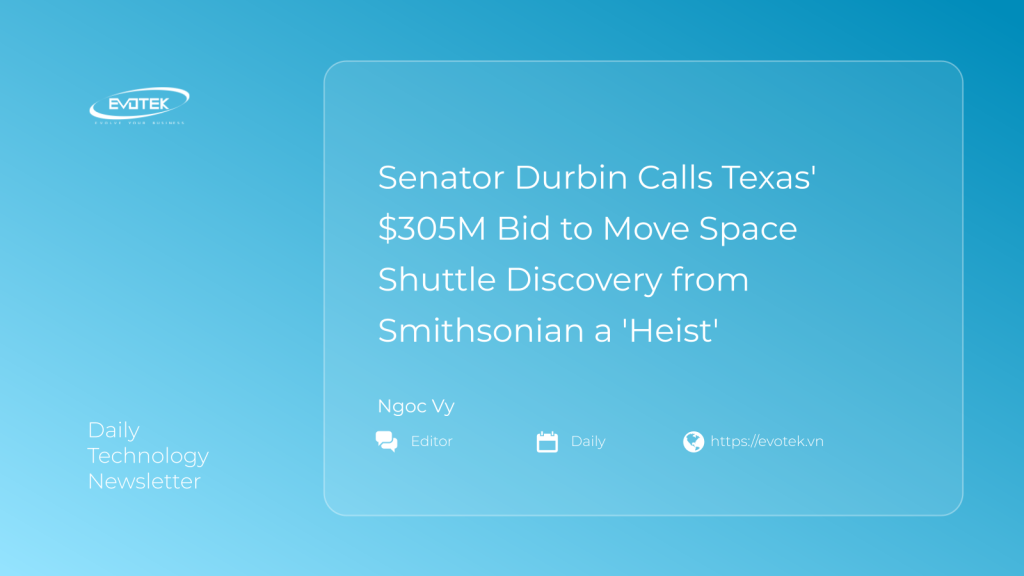The Contested Future of Space Shuttle Discovery
A contentious debate has ignited over the future of NASA’s retired Space Shuttle Discovery, currently a prized exhibit at the Smithsonian National Air and Space Museum. Efforts by Texas lawmakers to relocate the iconic spacecraft to Space Center Houston have met strong opposition, with a U.S. Senator describing the proposed move as a “heist.”
During a recent Senate Appropriations Committee budget hearing, Senator Dick Durbin (D-Ill.) vociferously challenged the proposed transfer. “This is not a transfer. It’s a heist,” Durbin declared, asserting that Texas was attempting to seize the shuttle after losing a competitive bid over a decade ago for one of the retired orbiters.
The push to bring Discovery to Texas gained momentum in April, when Republican Senators John Cornyn and Ted Cruz, both representing Texas, introduced the “Bring the Space Shuttle Home Act.” This legislation sought to move Discovery from the Smithsonian’s Steven F. Udvar-Hazy Center in northern Virginia to Space Center Houston. A provision, albeit more broadly worded to comply with Senate rules, was subsequently inserted into the “One Big Beautiful Bill,” which President Donald Trump signed into law on July 4.
Senator Cornyn lauded the bill’s passage, stating, “Houston has long been the cornerstone of our nation’s human space exploration program, and it’s long overdue for Space City to receive the recognition it deserves by bringing Space Shuttle Discovery home.”
Funding and Ownership Concerns Threaten Relocation
However, Senator Durbin raised two critical concerns that threaten to derail the ambitious relocation plan:
- Exorbitant Costs: Durbin highlighted a significant discrepancy in funding. While the reconciliation bill allocated $85 million for the shuttle’s transfer, research by NASA and the Smithsonian indicates the true cost is closer to $305 million. Furthermore, an estimated $178 million would be required to construct a suitable facility to house and display Discovery in Houston, bringing the total potential expenditure far beyond the initial allocation.
- Smithsonian Ownership Rights: A more fundamental question arises regarding Congress’s authority to unilaterally remove an artifact from the Smithsonian’s esteemed collection. The Washington, D.C.-based institution firmly asserts its ownership of Discovery. Documentation signed in 2012 explicitly transferred “all rights, interest, title, and ownership” of the spacecraft from NASA to the Smithsonian.
“This will be the first time ever in the history of the Smithsonian someone has taken one of their displays and forcibly taken possession of it,” Durbin argued, questioning Texas’s right to claim the artifact.
It’s worth noting that Houston was not alone in its disappointment during the original 2011 competition for the retired space shuttles. Cities like Chicago, represented by Senator Durbin himself, also vied for an orbiter. Ultimately, NASA awarded the shuttles to the National Air and Space Museum, the Kennedy Space Center Visitor Complex in Florida, and the California Science Center in Los Angeles.
“Houston, We Have a Problem” Amendment Highlights Waste Concerns
To underscore his objections during the hearing, Senator Durbin introduced a symbolic amendment aptly titled “Houston, We Have a Problem.” This amendment sought to “prohibit the use of funds to transfer a decommissioned space shuttle from one location to another location.” While he later withdrew the amendment, Durbin’s message was clear.
“I think we’re dealing with something called waste. Eighty-five million dollars worth of waste,” Durbin concluded, urging his colleagues to consider the implications of such a contentious and costly endeavor. “I hope that we think about this long and hard.”

 日本語
日本語 한국어
한국어 Tiếng Việt
Tiếng Việt 简体中文
简体中文